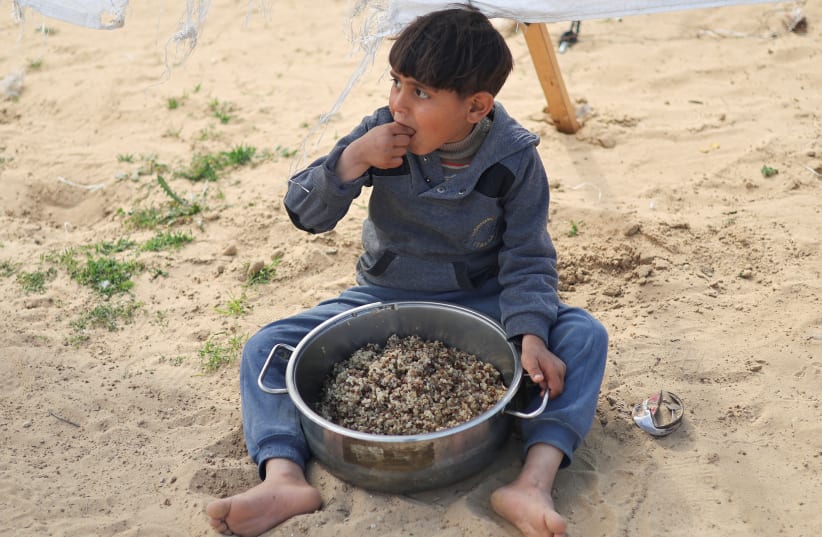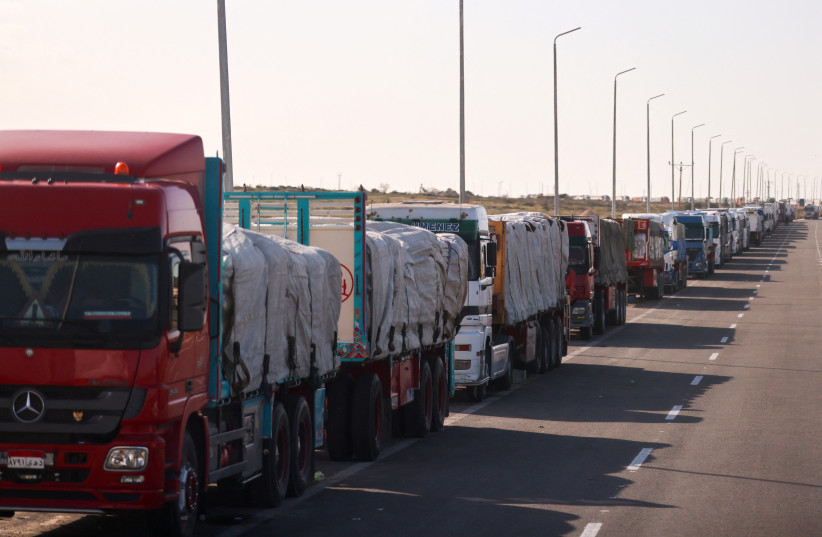World media has been focusing in the past week on what it called the “Hunger” in Gaza.
Biden administration officials told Minister Benny Gantz in Washington on Monday that the “food shortage crisis” impacting Palestinians in Gaza is “intolerable,” and improving the distribution of humanitarian aid in the region will be a primary focus during their discussions.
According to Reuters, The United Nations said in February that more than a quarter of Gaza’s 2.3 million people were “estimated to be facing catastrophic levels of deprivation and starvation.” It said that without action, widespread famine could be “almost inevitable.”
“The food shortage and use of the word ‘hunger’ have been exaggerated,” a senior Israeli defense official told me on Thursday during a briefing. “There is no hunger in Gaza,” he said, explaining that most of the food that Israel has been sending into the Strip has “immediately been taken by Hamas terrorists, who then sell some of the supplies for ten times more than what it’s worth.”
How severe is the food shortage in Gaza?
He said that “every family has enough food to survive. Are they eating five meals a day? The answer is no. We have been supplying them with aid as well as the US, but unfortunately, it wasn’t distributed to the citizens themselves.”
A former senior Israeli defense official who I spoke to on condition of anonymity has also said that “there is no food shortage in Gaza; there are those who are hungry since Hamas has taken all of the food and they don’t have enough money to pay Hamas on the black market.”
According to this former official, the food does not reach those who need it most since Hamas controls approximately 70-80% of the area. What happens is that Israel and foreign countries bring food and aid into Gaza. Then gangs take the supplies at gunpoint, and a significant portion of the population is left unable to afford necessities.
“THE SITUATION in Gaza is akin to hunger in New York, where homeless people suffer not from a lack of food but from a lack of money to purchase it,” he explained.
While it’s not accurate to say there is a famine in Gaza, there are indeed hungry individuals struggling because they can’t afford food. Even if Gaza were to be inundated with food supplies, hunger would persist because the issue at its core is not about availability but access and affordability.
“This condition reinforces their narrative, portraying hunger as a consequence of external forces and legitimizing their control,” he explained.
Changing this narrative is challenging, especially now that food shipments have increased. He said that during this past week, Israel has sent 50% more trucks with supplies into Gaza, compared to the daily amount that entered before the war – with about 150 trucks entering during a specific day this week. Previously, food also came through Egypt or via the Rafah crossing. Despite an increase in supply, with around 150 trucks entering midweek instead of the usual 100, the “problem” persists.
After crossing the border, trucks often fall prey to criminal gangs and Hamas, who hijack these supplies for sale on the black market. This action deprives people in desperate need of food, particularly those without the financial means or physical strength to secure it.
Furthermore, according to this former official, Hamas actively works against the distribution of food, attempting to shoot down food drops from the United States, Jordan, and the UAE. The presence of shoulder-fired missiles adds to the difficulty, as it becomes increasingly challenging to deliver aid accurately from a very high altitude, sometimes resulting in supplies being swept kilometers off course or into the sea.
THE MOTIVE behind targeting food aid is clear: to demonstrate a lack of food and, by extension, an ongoing state of hunger. This tactic aims to suggest that any resolution in Gaza that diminishes Hamas’s power – including peace – is undesirable. From their perspective, any solution that might improve conditions in the embattled enclave without their involvement signals the end of their rule. Thus, the humanitarian crisis continues, driven not by a genuine concern for the population’s well-being but by fear and their desire to maintain control.
“We should have categorized this war as the Israel-Iran War or even the West-vs-Iran war,” a third senior defense official who spoke to The Jerusalem Post said on Thursday, explaining that this war and all of its fronts are all related to Iran. He mentioned Hamas, Hezbollah in Lebanon, the Houthis in Yemen, and other terrorist groups funded and influenced by the Islamic republic.
In addition, he explained that Israel has been acting against and eliminating Iranian proxies around the world. Though the Jewish state has seen many successes in this area, he said he was disappointed that Western countries, such as the US, UK and others, haven’t been doing the same.
“The Americans should also be actively eliminating Hamas proxies because it is in their interest,” the official said. “Unfortunately, and although we have tried to convince them to do so, they haven’t yet understood the importance – not only from an Israeli perspective, but actually from their own.”
Hamas controls an enormous amount of food and aid. If it had allowed the citizens of Gaza to have access to this aid, the situation would have been very different – but they don’t care about their citizens but want them to starve because it helps them create their false narrative.
We cannot fall into such a narrative, and we need to tell the world the truth. This may be the only way for the citizens of Gaza, who are deprived of food, to receive what they rightfully deserve.

